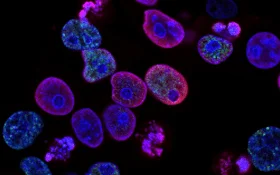- In-Stock Tumor Cell Lines
- Human Orbital Fibroblasts
- Human Microglia
- Human Pulmonary Alveolar Epithelial Cells
- Human Colonic Fibroblasts
- Human Type II Alveolar Epithelial Cells
- Human Valvular Interstitial Cells
- Human Thyroid Epithelial Cells
- C57BL/6 Mouse Dermal Fibroblasts
- Human Alveolar Macrophages
- Human Dermal Fibroblasts, Adult
- Human Lung Fibroblasts, Adult
- Human Retinal Muller Cells
- Human Articular Chondrocytes
- Human Retinal Pigment Epithelial Cells
- Human Pancreatic Islets of Langerhans Cells
- Human Kidney Podocyte Cells
- Human Renal Proximal Tubule Cells
Primary cell lines—derived directly from the tissue of a human or animal subject—offer a number of valuable laboratory benefits to medical researchers. These cells are extremely useful for replicating in vivo conditions in a lab and generating accurate biological data.
However, primary cell lines have substantial drawbacks as well, not the least of which is their finite lifespan. Primary cells eventually reach replicative senescence—that is, they lose their ability to proliferate, generally after 10-50 passages. This irreversible phenomenon places firm limits on the utility of primary cell lines, which cannot be relied on for long-term study. For this reason, immortalized cell lines (sometimes called continuous cell lines) have become increasingly prominent as a biomedical research tool.
How Cell Lines Become Immortalized
Immortalized cells are primary cells that have undergone a mutation that renders them immune to the process of senescence. There are several ways this can occur. Immortalization sometimes results from spontaneous mutation, but this is an inefficient way of obtaining these kinds of cells.
More commonly, immortalized cell lines are the product of careful manipulation in the laboratory. Common methods of inducing immortalization include:
Expression of hTERT protein – Expressing the human telomerase reverse transcriptase (hTERT) protein lengthens telomeres and prevents normal senescence. However, this process is not always effective with certain cell types, such as epithelial cells.
Introduction of SV40 T-antigen – The simian virus 40 (SV40) T-antigen has been shown to be powerfully effective in eliminating cellular limits on proliferation by manipulating the host cell cycle. Other viral genes can induce immortalization in this manner, but SV40 T-antigen is widely considered the most reliable agent available.
Combined approach – Certain types of cells produce the best results when hTERT and viral gene methods are used in conjunction.

Advantages of Immortalized Cell Lines
Aside from their lack of senescence, immortalized cell lines extend multiple advantages to biomedical researchers:
Consistent results – Immortalized cell lines are (generally) homogenous and can be used by any number of laboratories. Consequently, these cell lines promote consistency in research data and the ability to reproduce findings.
Ease of maintenance – Compared with primary cells, immortalized cell lines are easier to culture.
Large supply – Their ability to proliferate indefinitely makes immortalized cell lines more common and more readily obtainable than primary cells.
Cost-effectiveness – Not only do immortalized cell lines last longer than primary cells, they’re also easier to store and transport. This reduces the total financial burden associated with the laboratory use of these biological materials.
These qualities have made immortalized cell lines the preferred choice for researchers of gene function, antibody production, drug metabolism, and many other key biological processes.
AcceGen carries approximately sixty distinct immortalized cell lines, including those derived from human, mouse, and rat subjects. We also offer a Custom Cell Immortalization Service that can accommodate your unique research needs. To learn more about our products and services, visit AcceGen online at https://www.accegen.com.
About AcceGen
Founded in 2016, AcceGen has earned a reputation as one of the premier biotech companies in the U.S. AcceGen distributes custom genomic research solutions to organizations and researchers in many fields, including pharmaceutics, cell biology, biotechnology, and specialty ingredients. The company is headquartered in Fairfield, New Jersey.
META: Leading biotech company AcceGen explores the various lab uses of immortalized cell lines, which offer researchers a helpful alternative to primary cells.

Copyright - Unless otherwise stated all contents of this website are AcceGen™ All Rights Reserved – Full details of the use of materials on this site please refer to AcceGen Editorial Policy – Guest Posts are welcome, by submitting a guest post to AcceGen you are agree to the AcceGen Guest Post Agreement – Any concerns please contact [email protected]








